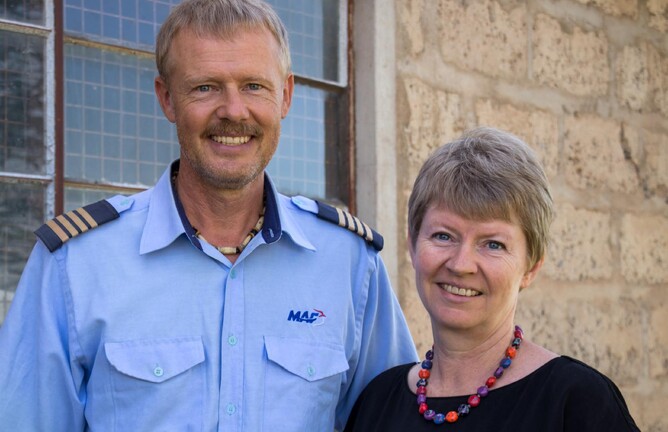LogLogo is a small village in northern Kenya, populated primarily by members of the Rendille and Samburu tribes. Life for most consists of herding sheep, goats, cattle, and most valuable of all—camels. LogLogo was once home to an Africa Inland Mission (AIM) mission base (which has now partly become the MAF base), and the AIC church is thriving there today.
Melvin and Kari Peters have been serving in LogLogo since 2016. LogLogo is a single-family base positioned to facilitate flights to the isolated areas of northern Kenya. Life in this remote village is both challenging and rewarding, requiring lots of mechanical and relationship-building skills.
Melvin and Kari talk about their move to Loglogo and the challenges of living in an extremely remote setting.
We came to scout out the land in 2015, to see how what they were looking for as a pilot and also as a base manager. And we decided that, yes, we could uproot our family and make this our new home. It's a “solitude base” where one family is situated. So yes, we moved, and we enjoyed setting up the base here. The house was a dilapidated old mission house that needed a lot of “TLC”, and so Kari and I have been busy fixing up this house, making it our home.
Our first impressions, even from when we came in for the first look-see, was LogLogo was a place of sunshine, of friendliness, that people were open and warm. They were excited about us coming. They almost made it easy for us to make the decision that LogLogo would be the place where we wanted to set up the base. And that continued once we moved here as well. They have continued making us feel welcome, making us feel like we were a part of the community.
But we know too that we are outsiders, and we are missionaries and they have expectations of us that we cannot actually fulfill. And there are some things that we feel like we are not called to do. These things that they would like us to do, but we are here to serve greater northern Kenya. And the plane is not here for the people that have access to the road, but those that are beyond the roads. And so sometimes we can help the community with lots of little projects and things like that. And we find out that so much of the community is family. It's all about family—this person is a cousin, he is a brother. They all have the same aunts and uncles, and we are reminded that we are the outsiders. They make us feel welcome, but we do still feel like we are visitors.
Daily life for the community is still quite hard. The people are not nomadic anymore, they are settled and living in a village. They do a lot of manual labor. They have family members who are still nomadic, and who are living in remote little villages with the animals. That is a very different life. But many have chosen to stay by the village, sending their children to school. And so the women have to go out every day to gather firewood. And the young girls and ladies also have to go and collect water. We are hoping for a more localized water source, but as for now they have to walk over to the borehole and carrying the water home, 20 liters on their back at a time.
My flight schedules vary so much. Sometimes I have one flight after another after another, and then it's two weeks of no flights. Sometimes I fly the shuttle to Nairobi. Next time the shuttle is too full, so they send the bigger airplane. And next time there's nobody, so the whole flight is canceled. Or there's one person and I might or might not take him, or then they also cancel by the end and then there's no flight. So it can vary from busy, to flying more than the guys in Nairobi, to not flying at all. So we never know exactly how it's going to be. And so you look at the schedule there's nothing on there and then find out tomorrow, actually you have a flight now.
In Loglogo I'm a Jack of all Trades...I grew up on the farm in northern Canada so I learned to do everything, a little bit at least. Even this week I tried to buy wood to make a little shelter for my watchmen. I found out that there is a ban on wood, so I ended up buying metal and going back to welding again. I worked on that a little bit yesterday and got one wall welded up. We've been here for two and a half years and the guards don't yet have a proper shelter. They're living on our back porch. So it's not ideal, especially when it's raining and they are trying to hang up a tarp so that they don't get wet at night. I want to make that a little bit more comfortable for them.
